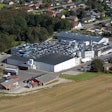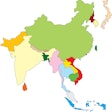The National Farmers Union, while admittedly leaning left of center on the political spectrum, has always been staunchly nonpartisan on issues facing America's farmers and ranchers, NFU President Roger Johnson told assembled members of the Kansas Farmers Union during their annual convention. Under the Trump administration, however, the political climate has devolved into warring ideologies entrenched within party lines, and driven by the increasingly erratic whims (and tweets) of the president himself. The situation has become so volatile that its most defining characteristic may be its unpredictability.
Which, he added, might be the point.
"Voters elected this administration because they wanted Washington to be unpredictable, and it is," he said. "Who would have thought we would have a tax bill that added two trillion dollars to the deficit, and it passed without a whimper of objection by the party that has historically stood for fiscal responsibility?" That it was passed in the dead of the night along straight party lines made it even more egregious, and the outcome glaringly predictable.
Johnson, who has headed the organization since 2009, was joined by NFU government relations representative Aaron Shier. They presented insights into the 2018 Farm Bill, trade agreements with China, the ailing farm economy, potential results from the midterm election in which Democrats gained majority in the House of Representatives, and other agricultural-related issues.
The convention's focus, "Rural Resilience: Opportunities and challenges facing rural Kansans," included discussions on the pros and cons of a single payer healthcare system, alternative financing for food and agricultural products, effective livestock management practices, harvesting opportunities in Kansas, and a networking roundtable for people who choose to live and work in a rural setting. Sponsors included Midwest Regional Agency, Frontier Farm Credit and Farmers Union Insurance.
On the national level, Johnson has overseen a number of farm-related policy initiatives, including the passage of the 2014 Farm Bill, the Renewable Fuel Standard and Country-of-Origin Labeling, and legislation on climate change and trade deficits. Within the organization he has expanded educational programs for beginning, college-aged and women farmers, increased the numbers of Farmers Union state divisions, and developed a strategic plan for the organization.
Trade not only dominated the news, but it also illustrated the volatile unpredictability of the Trump administration, Johnson said. While he agreed with President Trump that China needed to be held accountable for its trade practices, he differed with the administration's assertion that China wouldn't dare retaliate with its own embargoes.
"Of course they would," Johnson said. "Trump has correctly diagnosed the problem, but he has really messed up any resolution for it. We should have been in a position to lead the world in holding China accountable, but we have totally abdicated that ability. The escalating trade war alienated our allies, harmed our reputation and created a mess that nobody seems capable of resolving. It's the opposite of how it should have turned out."
It's also the opposite of what was promised. Instead of renewed prosperity for Americans, prices for goods are increasing while markets are drying up, and nowhere is this more evident than in the agricultural sector.
"Times are tough in agriculture," Johnson said. "There's no question that when you see net farm income drop by 50 percent in five year's time, that's a real financial challenge for farmers and ranchers. On a national level, half of all the two million farms across this country have negative net farm income. That's a problem. That's why many of us, even though we're full-time farmers, end up working jobs in town in order to continue the farming and ranching tradition."
Part of the problem is corporate monopolization. Some tech companies have market capitalization greater than the gross domestic product of many nations, and they did it the old-fashioned way by buying up markets, he said. Massive consolidations in ag-related industries increasingly threaten small-scale farmers and ranchers by reducing their access to fair market prices. Though there's a growing awareness of the problem, Johnson doesn't anticipate any legislative actions to alleviate the situation.
The likelihood of congressional approval of a 2018 Farm Bill remains uncertain, too. The current bill, adopted in 2014, expired earlier this year, but the House and Senate remain divided over their own competing bills. The expiration creates an even greater urgency for a strong farm bill that would both create new markets and provide a safety net for farmers and ranchers, Shier said.
The expiration led to confusion over which programs are still operational.
"The devil is in the details, program by program," Shier said. "It can vary by title within the farm bill. For example, the Conservation Reserve Program is halted, but EQIP (Environmental Quality Incentives Program) is funded through fiscal year 2019."
While the outlook for a bill's completion was anyone's guess, Shier heard that one might be ready by the end of the year. It would be an evolutionary farm bill, not a revolutionary farm bill, he said, with relatively minor changes to the major commodity programs. If no bill was adopted, an extension to the 2014 bill was expected.
Johnson seemed less optimistic. He had heard Collin Peterson, the Ranking Member of the House Committee on Agriculture, speak at a convention two weeks prior, and it was Peterson's belief that the farm economy was in such tough shape that it would require congressional action to prevent an economic disaster. Though extending the bill was the likeliest scenario, he said, it would only escalate the uncertainties.
On a more positive note, the midterm elections promised more discussions on climate change, he said, though it would still need bipartisan support for sensible legislation. Despite the administration's hostile stance on climate change, he sees a growing consensus between Democrats and Republicans that climate change is real and that it needs to be dealt with. He was reminded of the 2008 presidential election where Barack Obama and John McCain both supported cap and trade legislation.
Johnson urged Farmers Union members to continue leading the discussions.
"You won't find very many other agricultural organizations that will talk about climate change," he said. "Not that many years ago, we were the largest aggregator of soil carbon credits in the country. We had literally millions of acres under contract with folks who had voluntarily signed up to do certain practices that were scientifically demonstrated to be good for the earth. We need to play some small role in helping America join every other nation on earth in solving this great existential crisis."
Effective congressional legislation can only happen if it's done on a bipartisan basis, he said. Now that the election is over and some of the rhetoric is settling down, Republicans and Democrats who are in charge of those big issues can start having conversations about resolving them. It won't be easy, but it will be necessary.
"That's a really big challenge, because I think that our political system is pretty badly broken right now," Johnson said. "But even though it's badly broken, it's the best and the only system we have, and we need to figure out how to make it work."

















